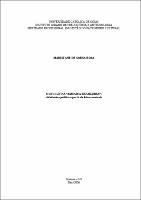| Compartilhamento |


|
Use este identificador para citar ou linkar para este item:
http://tede2.pucgoias.edu.br:8080/handle/tede/3427| Tipo do documento: | Dissertação |
| Título: | O reggae na “Jamaica brasileira” : cidadania e política a partir de letras musicais |
| Autor: | Rosa, Maristane de Sousa  |
| Primeiro orientador: | Mattos, Izabel Missagia de |
| Primeiro membro da banca: | Moura, Marlene Castro Ossami de |
| Segundo membro da banca: | Silva, Carlos Benedito Rodrigues da |
| Resumo: | A cidade de São Luís foi seduzida por um ritmo que conquistou a alma de grande parte da população maranhense negra de baixa renda, o reggae. Outrora nomeada de Atenas Brasileira, Cidade dos Azulejos, Ilha do Amor, a capital do Maranhão passou a receber o codinome de 'Jamaica brasileira', em menção à música do Caribe que se proliferou por todos os cantos da ilha. A cultura maranhense - amplamente reconhecida pelo tambor-de-crioula, o bumba-meuboi, o cacuriá, a Festa do Divino e os terreiros Mina - passou, assim, a ser representada pelo reggae, que veio nas ondas da indústria cultural a partir de meados da década de l970. Apesar de contestado por alguns defensores da “autenticidade cultural”, o roots jamaicano foi adotado por amplos segmentos da população e da juventude negra ludovicense, tornando-se um importante elemento de lazer e identidade étnica. Esta dissertação investiga características místicas, religiosas e políticas que denunciam desigualdades étnicas e sociais, partindo das letras musicais amplamente tocadas e conhecidas na cidade e revelando como a diáspora jeje superou problemas de construção da identidade, ao incorporar o reggae como seu patrimônio cultural. Os resultados colhidos na pesquisa de campo etnográfica indicam o amplo significado social deste patrimônio, materializado nos rituais, nas roupas coloridas com cores panafricanas e nas recorrentes imagens de lion-man que passou a configurar cenário propício para reivindicações de cidadania e direitos políticos. O fenômeno estudado fornece visibilidade ao blefe de tradições atribuídas a um restrito grupo social dominante no Maranhão e aos processos de “higienização” vivenciados historicamente pelos africanos e descendentes. Para melhor situar a complexidade social e simbólica na qual o reggae foi concebido e estabelecido como linguagem identitária, este viés interpretativo reapresenta o ritmo jamaicano, buscando no Egito Antigo as raízes estéticas para o uso dos dreadlocks e no milenar ritual de passagem do povo Masai a figura emblemática do leão. |
| Abstract: | The city of St. Louis was seduced by a rhythm that captured the soul of a large population of low income black Maranhao, the reggae. Once nominated Brazilian in Athens, City of Tiles, Island of Love, the capital of Maranhão has given the codename of 'Brazilian Jamaica', in reference to music of the Caribbean that are proliferating in every corner of the island. The Culture from Maranhão - widely recognized by the drum-to-Creole, the bumba-meu-boi, the cacuriá, the Feast of the Divine and terreiros Mine - now, therefore, to be represented by reggae, which came in waves of the cultural industry from the mid-l970. Although disputed by some advocates of "cultural authenticity", the Jamaican roots were adopted by large segments of the population and the Ludovicense black youth, becoming an important element of ethnic identity and leisure. This dissertation investigates mystical characteristics, religious and political inequalities that condemn ethnic and social differences, from the lyrics and music played widely known in the city and showing how the Jeje diaspora overcome problems of construction of identity, to incorporate the reggae as its cultural heritage. The results collected in the ethnographic field research indicate the broad social significance of this heritage, embodied in rituals, in Pan-African colors and recurring images of lion-man who has set propitious scenario for claims of citizenship and political rights. The phenomenon studied provides visibility to the bluff of traditions attributed to a restricted social group dominant in Maranhão and processes of "cleaning" historically experienced by Africans and descendants. To better situate the complex social and symbolic in which the party was conceived and established as language identity, this interpretative bias resubmit the Jamaican rhythm, seeking the roots in Ancient Egypt to the aesthetic use of Dreadlocks and the ancient rite of passage from a Masai people emblematic figure of the lion. |
| Palavras-chave: | Identity and ethnic african descent Reggae |
| Área(s) do CNPq: | Ciências Humanas |
| Idioma: | por |
| País: | Brasil |
| Instituição: | Universidade Católica de Goiás |
| Sigla da instituição: | UCG |
| Departamento: | Instituto Goiano de Pré-História e Antropologia |
| Programa: | Programa de Pós-Graduação STRICTO SENSU em Gestão do Patrimônio Cultural |
| Citação: | ROSA, Maristane de Sousa. O reggae na “Jamaica brasileira”: cidadania e política a partir de letras musicais. 2009. 150 f. Dissertação (Mestrado Profissional em Gestão do Patrimônio Cultural) -- Instituto Goiano de Pré-História e Antropologia, Universidade Católica de Goiás, Goiânia, 2009. |
| Tipo de acesso: | Acesso Aberto |
| URI: | http://localhost:8080/tede/handle/tede/3427 |
| Data de defesa: | 18-Dez-2009 |
| Aparece nas coleções: | Mestrado em Gestão do Patrimônio Cultural |
Arquivos associados a este item:
| Arquivo | Descrição | Tamanho | Formato | |
|---|---|---|---|---|
| MARISTANE DE SOUSA ROSA.pdf | Texto Completo | 6,69 MB | Adobe PDF |  Baixar/Abrir Pré-Visualizar |
Os itens no repositório estão protegidos por copyright, com todos os direitos reservados, salvo quando é indicado o contrário.




